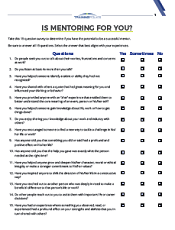TOP TRAINING COMPANY BEST PRACTICES

Technology is the biggest form of communication that millennials use today, both in their personal lives as well as in the workplace. As new tools are developed, millennials are the first ones to use them. However, what some people don’t know is that millennials also value face-to-face communication. They need more engagement than their employers realize which may be why some hiring managers find it difficult to find and retain millennials.
Millennials are now the largest generation in today’s workforce and are looking to their workplace superiors for mentorship. To meet this need, it is extra important that hiring managers learn to become effective mentors. Millennials look for instant feedback and are more competitive and success-oriented than the generations before them, due to the fact that from a young age they have had to compete for both education and employment.
Here are some modern mentoring approaches that you can take to set your millennials up for success.
1. Reverse Mentoring
Let your millennials lead the way. Reverse mentoring can be a bridge-builder between different generations. This approach pairs up older workers with younger ones, to allow an exchange of ideas relating to both old and new business practices and how things can be improved. These sessions can take place once or twice a month and can focus on a wide range of topics, such as how to improve technology, communication, and customer delivery.
Reverse mentoring adds invaluable perspective for all generations involved. It’s a win-win situation because executives are able to stay up-to-date with current trends, and millennials have a chance to share their contributions.
2. Group Mentoring
This approach is very effective because it allows for multiple experts and multiple learners within a group setting. Although structured as a group setting, the learning is individual and learners can align themselves with those who have skills similar to the ones they are trying to improve.
For example, a mentee could pair up with someone who has a specific focus on technology, interviewing, team development or social media. Group mentoring provides a comfortable setting because learners can interact with their peers, as well as receive guidance from a more senior person.
3. Anonymous Mentoring
This form of mentoring is when the mentee does not know who their mentor is. Mentors are often chosen through a third party company selected by their organization, after psychological and background tests are done to pair them the mentee who can benefit most from the skills and experience they have to offer.
There are many benefits of anonymous mentoring, including higher levels of disclosure and sincere feedback. Since the mentor and mentee remain anonymous, they may be more willing to share personal information, problems, and uncertainties they experience. Exchanges are conducted entirely online which is especially great for millennials who are technologically savvy and crave instant feedback.
4. One-on-One Mentoring
This traditional form of mentoring is still an effective and powerful way to develop millennials. Relationships are very important to millennials, and having these one-on-one interactions provides them with personal attention, feedback, and the opportunity to both share and challenge their mentor’s ideas.
To use this type of mentoring, create a structure and stick to it. This should include regularly scheduled meetings and consistent communication. Mentors can also invite mentees to shadow them at work, to observe them conducting a meeting, or even recommend an e-book for them to read.
By properly mentoring your millennials, you have a better chance of retaining them and helping them prosper within your organization. It is crucial that you establish an effective mentoring program that will help shape your millennials for future leadership roles to meet the challenges of the ever-changing workplace.
Does your organization have a mentorship program or are you thinking of starting one? This short "Is Mentoring for You?" survey can help identify your more senior employees who would make great mentors for your millennials. Download the survey!

References:
https://hbr.org/2010/05/mentoring-millennials
https://www.forbes.com/sites/kaytiezimmerman/2016/07/18/modern-mentoring-is-the-key-to-retaining-millennials/#3ae39a1d5fc8

